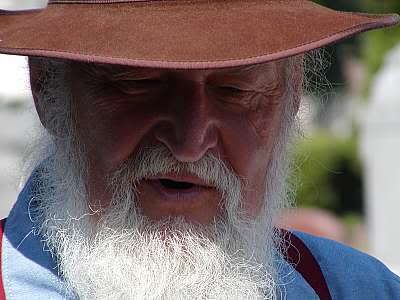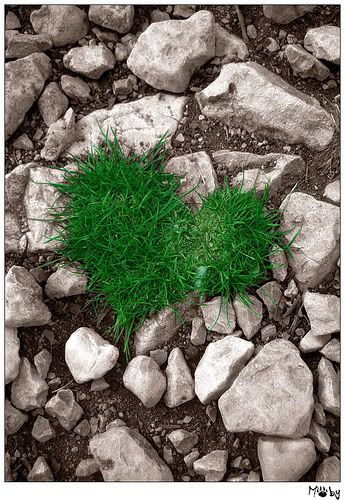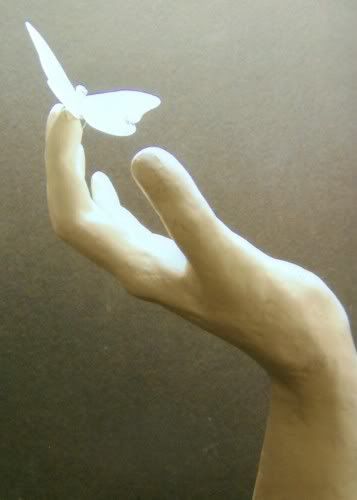 Time/energy/worry has me putting off writing about my mom's visit... although she's constantly in my thoughts - until then, this missive from the FolkDJ list seems a suitable segue:
Time/energy/worry has me putting off writing about my mom's visit... although she's constantly in my thoughts - until then, this missive from the FolkDJ list seems a suitable segue:
The following was posted on the blogspot that Utah's son Duncan set up.
Utah turned 73 yesterday. Please remember him on your playlists and let listeners know about his condition. Donations may be sent to: Utah Phillips, PO Box 1235, Nevada City, CA 95959
Dear Friends,
Utah here, with a rambling missive pandect and organon regarding my current reality. At no time should you suspect me of complaining (kvetching); I am simply grepsing (Yiddish word for describing the condition of that reality). First, medical: My heart, which is enlarged and very weak, can’t pump enough blood to keep my body plunging forward at its usual 100 percent. It allows me about 25 to 30 percent, which means I don’t get around very much or very easily anymore. I’m sustained (i.e., kept alive) by a medication called Milrinone, which is contained in a pump that I carry around with me in a shoulder bag. The pump, which runs 24 hours a day, moves the medication through a long tube running into an implanted Groshong catheter that in turn runs directly into my heart. I’ll be keeping this pump for the rest of my life. I also take an extraordinary number of oral medications, of which many are electrolytes. My body is weak but my will is strong, and I keep my disposition as sunny and humorous as I’m able. It’s hard enough being disabled without being cranky as well. Though I’m eating well, my weight has gone from 175 to 155 pounds. I look like a geriatric Fred Astaire.
We manage to get out a good bit, visiting the Ananda (a local spiritual village and retreat center) flower garden up on the San Juan Ridge and occasionally going to lunch at various places around town. The bag is always with me. Believe me, none of this would be possible without my wife Joanna. She has the deepest, most loving and caring heart one could ever imagine. She’s taken charge of all my medications and makes sure that I’m well fed and don’t fall into the slovenly ways of a derelict. She also has enormous physical beauty—I have never seen a more beautiful woman in my life. She is endowed with intelligence, deep insight, compassion, and a capacity for love that passes all understanding.
Heart disease aside, I find that I have a hernia that needs to be repaired. Someday I suppose I’ll become like Ernie Bierwagen, the old man who owned the orchards outside town. He said to me once, “I know that God wants me to say something, because the only thing I have left that works is my mouth.” But for now, I’m enjoying my life and can think of no good reason not to. Joanna and I both know that the chemical regimen I’m on can’t go on indefinitely. We take things a day at a time, deriving joy and solace from a solid, loving relationship.
I want to share with you something about where we live. If you’re reading this on the Internet, I’ve sent Duncan some photos to show you what it looks like. Our house is on a country lane right off Red Dog Road, about a mile from downtown Nevada City. Nevada City is an old gold-mining town in the Sierra foothills with a population of about 2,800. The old buildings are all still here, including the National Hotel, one of the oldest hotels in the West that’s still doing business. The town is a quirky, mystical sort of place, populated by poets, writers, artists, misfits, and just regular folks. When you drive down Berggren Lane where we live, you come to a brown house with green trim, lap-strake siding, a steel roof, and a high green fence around the front. The steel roof is there because we live in an ancient oak and cedar grove, which incl udes in the front yard a couple of towering poplar trees. Sometimes the wind coming down from the high Sierra breaks off tree limbs, and ! if it weren’t for the steel roof, we could well be eating our salad by the roots.
When we first moved in here, the house was tiny. Using her remarkable ingenuity and the prodigious skills of our friend Steven Goodfield, a fine independent carpenter, Joanna has added a hallway and two rooms going up the hill, which gives us a bedroom and bathroom, and me a study. The French doors in our bedroom open out onto a dappled hillside with hawthorns, cedars, pines, wild cherries, and oaks. The lot itself is quite narrow, the result of a bad survey many years ago. The old part of the house was built in 1912. When we bought it, there was a greenhouse along the southern wall. It was rotting out, so we replaced it with a new, insulated and thermo paned greenhouse so that we could remove the interior wall and make it almost part of the living room. Our house is a beautiful, comfortable place to live, absolutely surrounded by greenery.
Looking out the greenhouse windows now, I can see the huge poplars in front, already in full leaf. The front yard is Joanna’s flower garden, a great splash of color amid the green. As I look over my shoulder out the greenhouse door, which is also the front door to the house, I can see the hawthorn trees covered with cascades of white blossoms, as though their limbs were burdened with new snow. There’s a brick patio just outside the greenhouse with a fireplace and a small pond crowned with a bronze frog who emits a stream of water into the pond, which, when the weather is warm, we can hear from the bedroom when we’re going to sleep.
Opposite the greenhouse is the kitchen, with a wonderful early 1930s gas range, one of those with a two-lid firebox on one end. Outside the kitchen window is a railed porch built by our friend Kuddie, which overlooks another flower garden and an old apple tree, still bearing, that was probably planted when the house was built. The lot itself, narrow though it is, goes up the hill quite a way, where it levels off through the cedars and ends at a large open space that was a vegetable garden when I was still able to do that sort of thing.
The cedars are gigantic and quite an anomaly, a patch of forest that was never logged, probably because of the bad survey. It simply got missed. Walking in it now is like walking in the quiet of a much larger forest.
Walking up the hill, you pass three small outbuildings. One, called Marmlebog Hall (Joanna’s children call her Marmle), is where Kuddie ordered and maintained the CDs I used to travel with. It also contains a small labor library. The second building is a small barn on uneven stilts because of the hill. It’s there for storage. Don’t ask me what all is in it, but I do know it would drive an archaeologist mad. Among other things, it houses about 15 collapsing cardboard boxes that contain what academics have characterized as my personal archives, but are in fact a jumble of papers and objects, the detritus of over half a century. The University of California at Davis once said they wanted to accession my archives. I said, okay, if you hire somebody to come and plough through those boxes, because I’m not going to. They never called back.
The third building up there is an old shed, tiny, drafty, but a place where I spent many happy hours making things when I wasn’t traveling: wooden swords, bird feeders, and such. For the past few years the workshop has been a henhouse with a chicken-wire enclosure. Nothing fancy: five hens and a large rooster named Ralph (Rooster-Dooster). Ralph enjoys the good life. You could poke three holes in Ralph and go bowling with him. The hens all have names, but I forget what they are. They give us eggs, which I think was the idea to begin with.
Last winter a bear broke into the chicken yard and tore the door off the henhouse. The hens and Ralph managed to escape by hiding behind an old chest of drawers. The first hen to reappear showed up in our dog Bo’s mouth; she was uninjured, but that condition would not have lasted much longer. The others came out of hiding one at a time. Before our friend Che Greenwood could come over to fix the door, we feared the bear would return, plus a great storm was kicking up. So we set up a round of chicken wire in the greenhouse, which, as I say, is part of the living room, and installed the chickens there. Eventually, the smell was overpowering. How can chickens live with themselves? It was Friday evening and I’d turned on my small portable radio, as at this time the power was out, to listen to a station in Sacramento that broadcasts opera from 8:00 p.m. till midnight. That Friday one of the opera excerpts featured was an aria from Puccini’s Tosca sung by Maria Callas. That’s when Ralph decided he liked opera. As she sang, he began to crow along, so I got Tosca as a duet between Callas and Ralph.
That’s when I said, these chickens have got to go back up the hill. I mean, it was Puccini, for God’s sake.
So. That’s domestic life here at our place.
A few words about me and the trade before I wind this up. When I hit a blacklist in Utah in 1969, I realized I had to leave Utah if I was going to make a living at all. I didn’t know anything abut this enormous folk music family spread out all over North America. All I had was an old VW bus, my guitar, $75, and a head full of songs, old- and new-made. Fortunately, at the behest of my old friend Rosalie Sorrels, I landed at Caffe Lena in Saratoga Springs, New York. That seemed to be ground zero for folk music at the time. Lena Spencer, as she did with so many, took me in and taught me the ropes. It took me a solid two years to realize I was no longer an unemployed organizer, but a traveling folk singer and storyteller—which, in Utah at the time, would probably have been regarded as a criminal activity.
I spent a long time finding my way—couches, floors, big towns, small towns, marginal pay (folk wages). But I found that people seemed to like what I was doing. The folk music family took me in, carried me along, and taught me the value of song far beyond making a living. It taught me that I don’t need wealth, I don’t need power, and I don’t need fame. What I need is friends, and that’s what I found—everywhere—and not just among those on the stage, but among those in front of the stage as well.
Now I can no longer travel and perform; overnight our income vanished. But all of those I had sung for, sung with, or boarded with, hearing about my condition, stepped in and rescued us. I can’t tell you how grateful I am to be part of this great caring community that, for the most part, functions close to the ground at a sub-media level, a community that has always cared for its own. We will be forever grateful for your help during this hard time.
The future? I don’t know. But I have songs in a folder I’ve never paid attention to, and songs inside me waiting for me to bring them out. Through all of it, up and down, it’s the song. It’s always been the song.
Love and solidarity,
Utah
[Added 6/4/08: Bruce Utah Phillips: May 15, 1935 ~ May 23, 2008. Here is a link to Indymedia pictures from the service and the "shrine" to Utah. ]
SONG: The Telling Takes Me Home by Utah Phillips
BOOK: The Big Red Songbook: 250-Plus IWW Songs by Utah Phillips (Afterword), Archie Green, David Roediger, Franklin Rosemont, Salvatore Salerno (Editors)
POEM: In View of the Fact by A. R. Ammons
The people of my time are passing away: my
wife is baking for a funeral, a 60-year-old who
died suddenly, when the phone rings, and it's
Ruth we care so much about in intensive care:
it was once weddings that came so thick and
fast, and then, first babies, such a hullabaloo:
now, it's this that and the other and somebody
else gone or on the brink: well, we never
thought we would live forever (although we did)
and now it looks like we won't: some of us
are losing a leg to diabetes, some don't know
what they went downstairs for, some know that
a hired watchful person is around, some like
to touch the cane tip into something steady,
so nice: we have already lost so many,
brushed the loss of ourselves ourselves: our
address books for so long a slow scramble now
are palimpsests, scribbles and scratches: our
index cards for Christmases, birthdays,
Halloweens drop clean away into sympathies:
at the same time we are getting used to so
many leaving, we are hanging on with a grip
to the ones left: we are not giving up on the
congestive heart failure or brain tumors, on
the nice old men left in empty houses or on
the widows who decide to travel a lot: we
think the sun may shine someday when we'll
drink wine together and think of what used to
be: until we die we will remember every
single thing, recall every word, love every
loss: then we will, as we must, leave it to
others to love, love that can grow brighter
and deeper till the very end, gaining strength
and getting more precious all the way. . . .
QUOTE: "Health is a large word. It embraces not the body only, but the mind and spirit as well... and not today's pain or pleasure alone, but the whole being and outlook of a man." ~ James H. West
 From today's Writer's Almanac:
From today's Writer's Almanac:





































